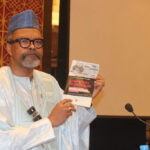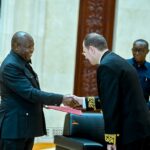My eyes filled with tears as I watched the Canada General Election results being broadcasted. It was a tremendous moment to watch the Liberals winning
almost every riding in the Atlantic Canada and many parts of the rest of the country. This particular moment reminded me the general election in Burundi
in 1993 when the Front pour la Démocratie Au Burundi (FRODEBU) defeated the Union pour le Progrès National (UPRONA) for a long waited-change in that
country. This moment brought back memories of my late maternal uncle who waited for so long to see a democratic change in Burundi. Unfortunately, the
change was short-lived because the democratically elected president Melchior Ndadaye was brutally assassinated by the soldiers (the enemies of that
change) after only 3 months in power.
As I watched this historical Canadian election and followed keenly commentaries from knowledgeable contributors at CBC’s Peter Mansbridge special edition, a unique expression blew out my mind. What caught my attention was the expression “Competitive Democracy”. When I heard this kind of democracy I said wow… This is what happened in Burundi in 1993 and
it is what is happening now in Canada to allow the Liberals to win this political landscape.
Competitive Democracy is what is needed to bring change in leadership,economy, education, health systems and all aspects that matter in the life of a country. Leaders of the parties work tirelessly to sell out their visions, agendas, and projects to the population and explain to them why their plans are better than those they seek to change. Candidates organize strong
campaigns on the ground and become ready to engage in debates in order to explicate, defend their plans, and criticize their opponents’ projects.
In competitive democracy candidates work very hard to bring change because “change is their motto”. They exhort voters to go out and vote instead ofprohibiting them from voting.
Competitive democracy is way different from consensual democracy. In competitive democracy, party leaders diligently work to reach out to as many citizens as possible. They call, visit citizens (door to door campaign) and advertise their plans in order to win confidence of many voters to win the general election. In the debates, leaders discuss, defend their visions, and challenge the plans of their opponents. In contrast, consensual democracy is more based on agreements and quotas that the constitution dictates as I have seen it in Burundi. Nowadays, the opposition has to be in government because the constitution allows it. In this kind of democracy, change is unlikely to happen because candidates talk about it, but they are not really driven by it. They are mostly motivated by the positions they will end up with after the elections. That is another reason why there exists a multitude of political parties in Burundi than any other country in the world because
their leaders know seats would be granted to them as they are in a consensual democracy. When their positions are threatened, parties leaders boycott the elections or call their supporters to the streets- a bad move that could lead to protest and ultimately to unrest as I have noticed in Burundi.
The population of Burundi does not really need consensual democracy to bring real change in the country or oust CNDD-FDD regime out. On the contrary,Burundians need a competitive emocracy that would provide an ample opportunity for party leaders to present their cases to Burundians who will therefore decide which party leaders possess what it takes to build a strong, prosperous, and free Burundi.
Contributions des lecteurs de B-24
Sammy Hakizimana







